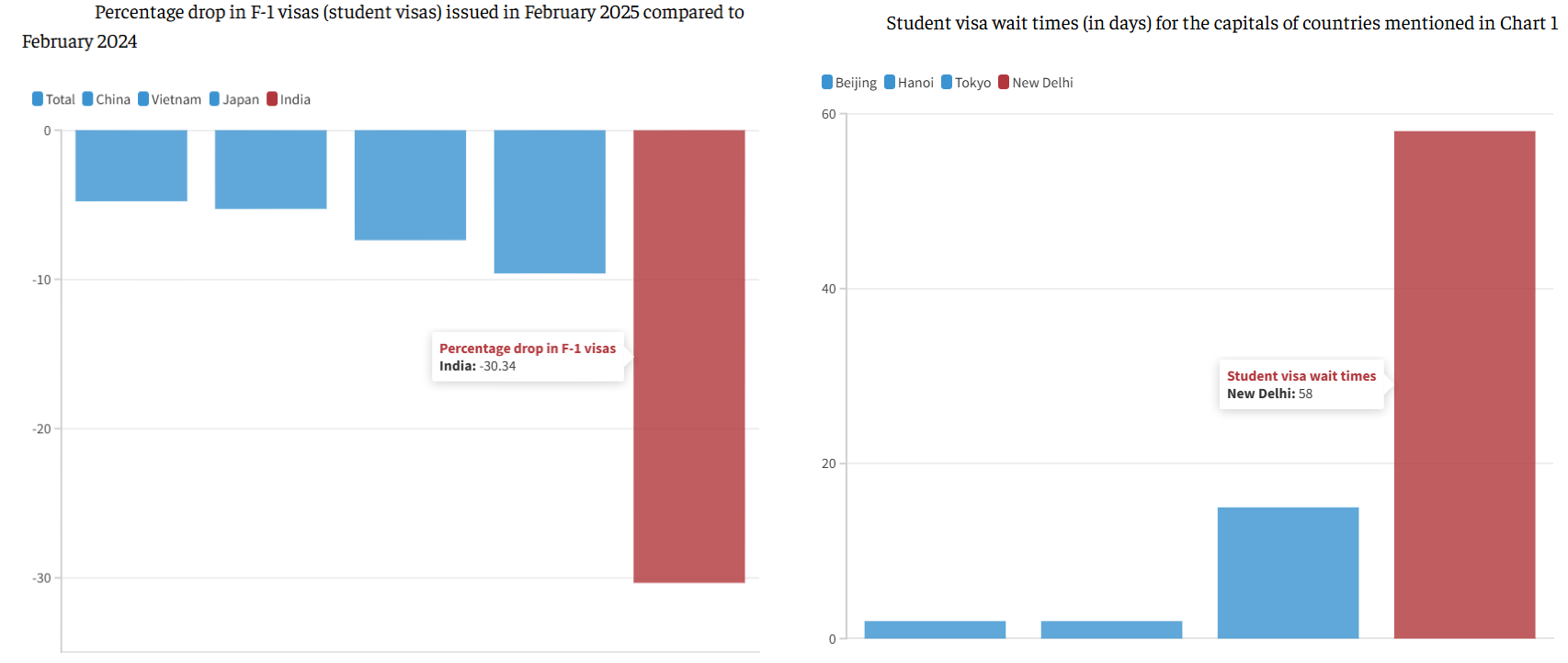International Relations
Tightening Student Visa Norms
- 23 Apr 2025
- 8 min read
For Prelims: Visa, Remittances, University Grant Commision, GIFT City, Vienna Convention
For Mains: Impact of Foreign Education Policies on Domestic Education Systems, India’s Soft Power and Global Influence
Why in News?
Indian students are facing a sharp drop in visa issuances and increasing visa revocations in the US, alongside tightening visa norms in Australia, disrupting academic plans and career aspirations.
What are the Concerns Regarding Indian Student Visas?
- Sharp Decline in Visa Issuance: In February 2025, the US recorded a 30% drop (590 to 411 visas) in F-1 student visas issued to Indian nationals compared to February 2024.
- This decline is disproportionately higher than the global average decrease of 4.75%, and significantly steeper than the drops for other top countries such as China (5.2%), Japan (9.6%), and Vietnam (7.4%).
- Visa wait times are also significantly longer for Indian students, averaging 58 days in Delhi, compared to just 2–15 days in East Asian capitals.
- Surge in Visa Terminations and Revocations: According to a survey by the American Immigration Lawyers Association (AILA), 50% of international students whose US visas were revoked in early 2025 were Indian nationals.
- The revocations were largely driven by the US State Department’s AI-based “Catch and Revoke” programme, which monitors social media and police databases, raising concerns over fairness, transparency, and diplomatic fallout.
- Legal and Financial Hardship: Students facing revocation must undergo complex legal procedures to restore their SEVIS (Student and Exchange Visitor Information System) status.
- Many have filed lawsuits, but the costs are prohibitive, and delays can cause students to lose academic terms, jobs, and scholarships.
- Targeted Visa Scrutiny: Reports suggest Australia has increased visa scrutiny for applicants from five Indian states Punjab, Haryana, Gujarat, Uttar Pradesh, and Bihar.
- This has sparked fears of profiling and unfair generalisations against Indian applicants from these regions.
What are the Potential Implications of Indian Student Visa Issues?
- Weakening of India’s Soft Power: India, along with China, is one of the two largest sources of international students but is facing setbacks due to a decline in US visas and stricter norms in Australia.
- These disruptions weaken India’s soft power and global presence in key fields like AI, climate science, and biotechnology.
- Risk to India’s Demographic Dividend: With 65% of India’s population under 35, access to global education is crucial for skill development. Visa curbs and revocations hinder opportunities, impacting long-term productivity and innovation.
- Decline in Remittances: In 2024, India received a record USD 129.1 billion in remittances, driven partly by Indian students in advanced economies.
- Stricter visa norms could reduce student migration and remittances, potentially impacting India's economy.
- SEVIS Removals: Unlike visa revocations, which prevent re-entry into the U.S. but do not automatically terminate a student's legal status, SEVIS removals bring swift and severe consequences, including the loss of employment eligibility and complications for dependents like spouses and children.
- Middle-class aspirants relying on loans or savings are most affected, experiencing both economic and emotional distress.
- Human Capital Drain and Redirection: The shift away from traditional destinations (U.S., Australia) toward emerging hubs like the Nordic countries and South Korea, alters the trajectory of India’s global talent flow.
- This re-routing affects network building, diaspora influence, and strategic industry placements, particularly in Science, Technology, Engineering and Mathematics (STEM), healthcare, and research.
- Pressure on Domestic Higher Education Infrastructure: As international avenues shrink, demand for quality institutions in India is expected to rise sharply.
- This may strain already limited Tier-I universities (IITs, IIMs, AIIMS) and push the University Grant Commission and All India Council for Technical Education (AICTE) to fast-track capacity building and accreditation reforms under National Education Policy, 2020.
What Strategies Can Mitigate Indian Student Visa Challenges?
- Leveraging Diplomatic Instruments: The Vienna Convention on Consular Relations (1963) empowers Indian missions to protect the interests of Indian citizens abroad. This legal provision should be more actively used to assist students facing visa issues.
- Strengthen the Emigration Act, 1983 to bring student visa consultancies under its ambit, making registration, accountability, and penalties enforceable for false promises or forged documents.
- Emergency Student Safety Net: Set up an Overseas Education Protection Fund (OEPF) under the MEA to assist students facing visa revocation, tuition loss, or forced deportation.
- Enhance Domestic Higher Education: India should incentivize top-tier foreign universities to set up campuses or offer joint-degree programs, as per the 2022-23 Union Budget, which allows world-class institutions to operate in GIFT (Gujarat International Finance Tec-City) City.
- Simultaneously, Indian universities, under NEP 2020, should adopt reforms like dual-degree programs, international faculty exchange, and establish Multidisciplinary Education and Research Universities (MERUs) to create a world-class education ecosystem.
- Digital Registry for Students: India should create a voluntary digital student registry for real-time visa tracking and embassy support.
- Indian embassies can develop an AI-based system, similar to the US "Catch and Revoke" program, to monitor students’ digital profiles and social media for early alerts on visa risks.
- Regulating Education Consultancies: India must tighten regulations on education consultancies by enforcing stricter registration, audits, and penalties for fraud, ensuring students are not misled.
- The Ministry of Education should launch awareness campaigns and provide a verified list of reputable consultancies to reduce scams.
|
Drishti Mains Question: Discuss the implications of tightening visa norms for Indian students. What measures can the Indian government take to address these challenges? |





